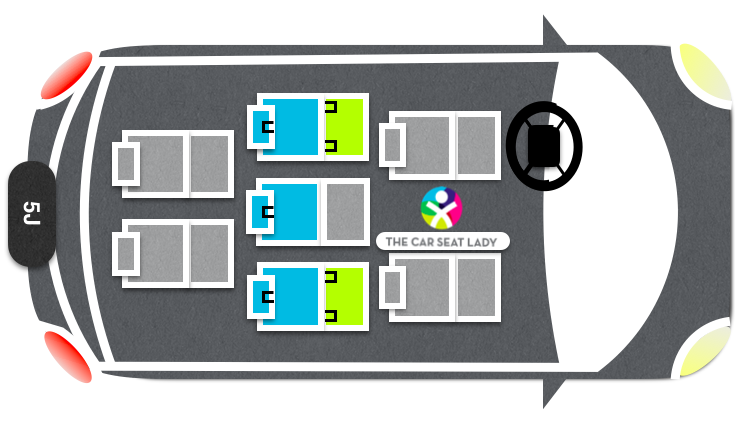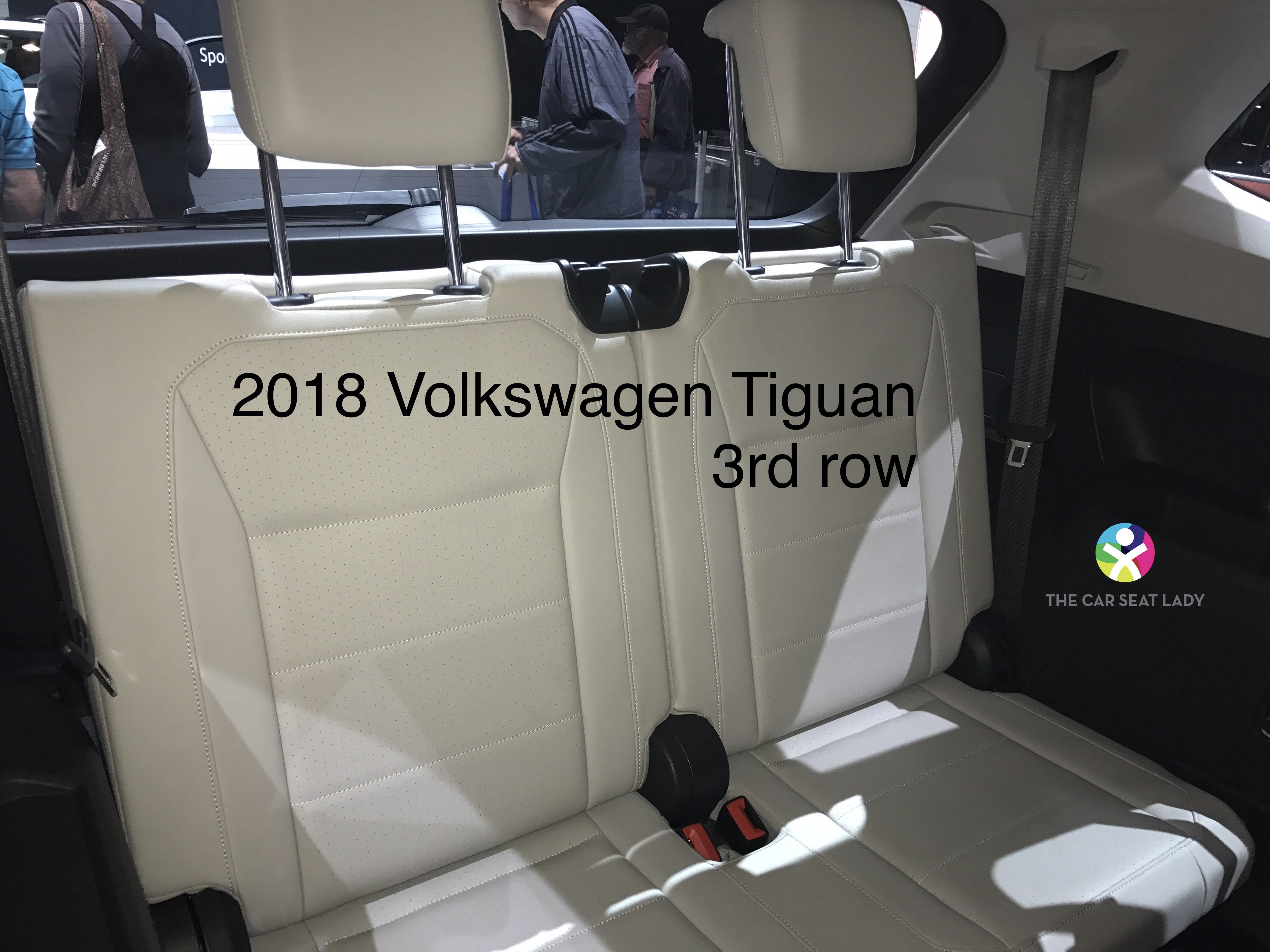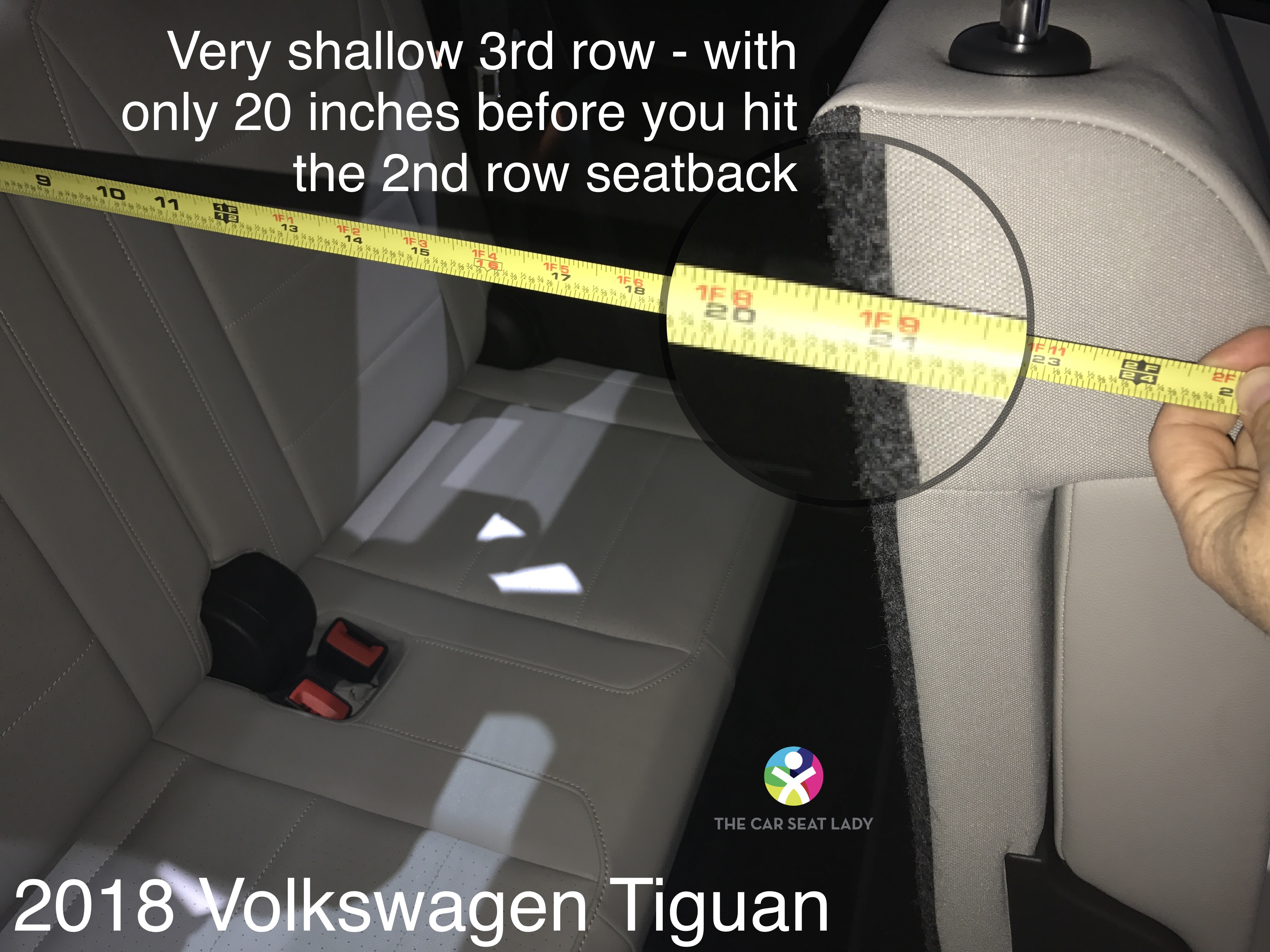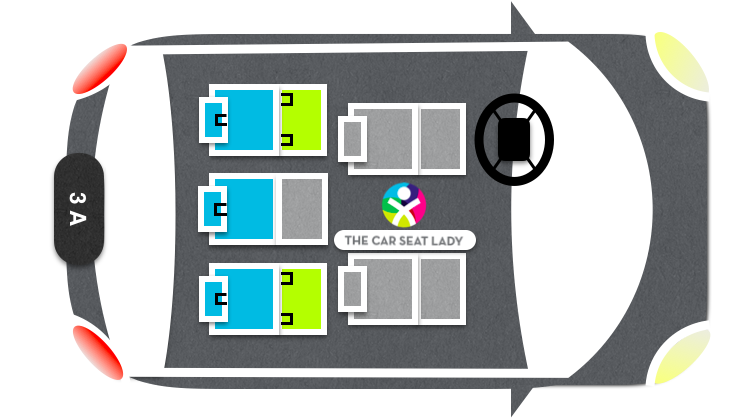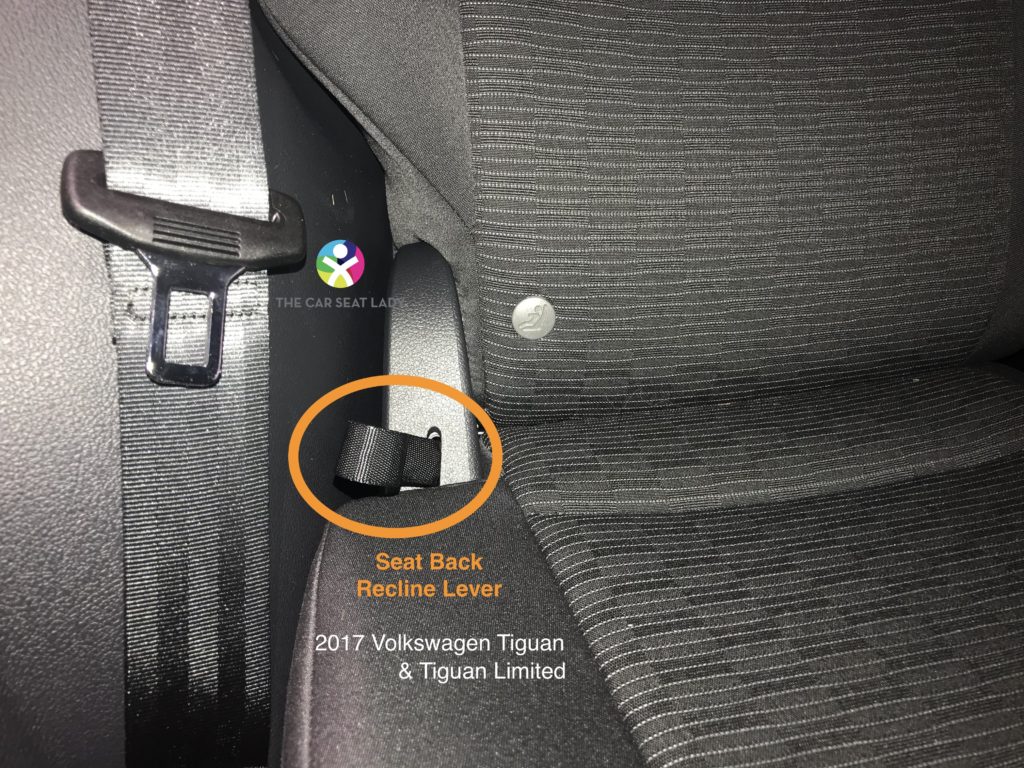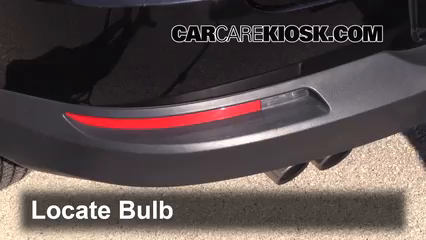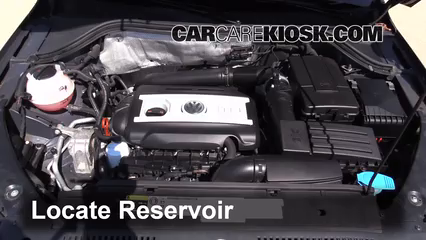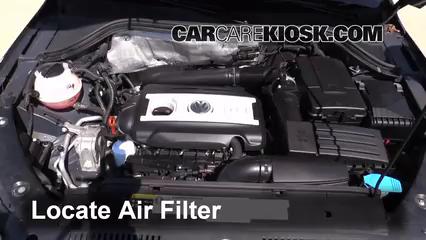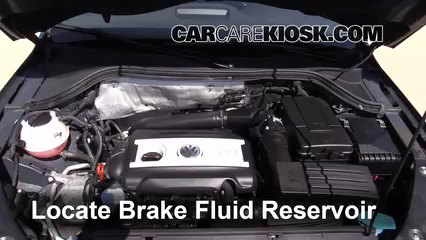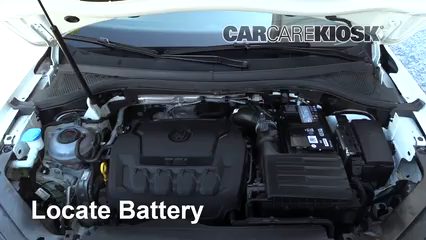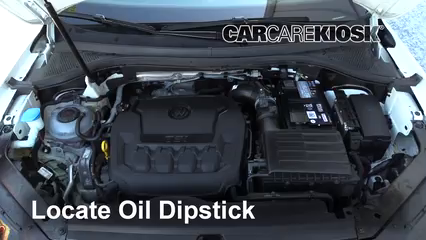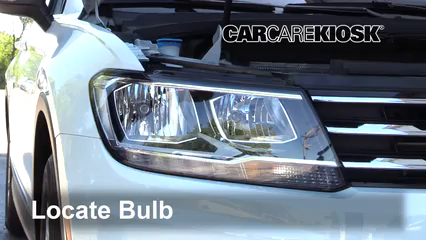- 2018 Volkswagen Tiguan (Extended)
- 2017-2018 Volkswagen Tiguan Limited
- 2009-2017 Volkswagen Tiguan
- Car Seat Installation: 2013 Volkswagen Tiguan S 2.0L 4 Cyl. Turbo
- Volkswagen Tiguan Model Years — 2009, 2010, 2011, 2012, 2013, 2014, 2015, 2016, 2017
- Car Seat Installation: 2018 Volkswagen Tiguan SE 2.0L 4 Cyl. Turbo
- Volkswagen Tiguan review
- What Car? has a buying service
- Overview
- Offers generous space for its occupants and a big boot. It’s far more than just a big box on wheels, though: its fine driving manners make it a great car to own. The closely related Skoda Karoq is better value for money, though, while the Volvo XC40 has a more upmarket interior.
- Performance & drive
- What it’s like to drive, and how quiet it is
- Engine, 0-60mph and gearbox
- Suspension and ride comfort
2018 Volkswagen Tiguan (Extended)
The Tiguan was completely redesigned for 2018 (but bizarrely the older tiny model continues to exist – now called the “Tiguan Limited” – and you can see more in the section farther down on this page about it). The 2018 Tiguan is 10 inches longer than the older models – and now has a 3rd row (albeit an itsy bitsy 3rd row).
If you need a 3-row vehicle and it needs to be a Volkswagen, the Atlas is the one to get – the Tiguan has a useless 3rd row that is too tiny to be functional (or safe) and restricted 3rd row access with car seats in the 2nd row which the Atlas doesn’t have due to it’s tipping car seat safe tilting feature for the 2nd row seats. There is also significant seat belt overlap between 2D and 2C in the Tiguan that is much less prominent in the Atlas – not to mention that the Atlas has tether anchors in all 5 positions, which the Tiguan only has in 3, and the Atlas has lower anchors in 3 positions, while the Tiguan only has in 2.
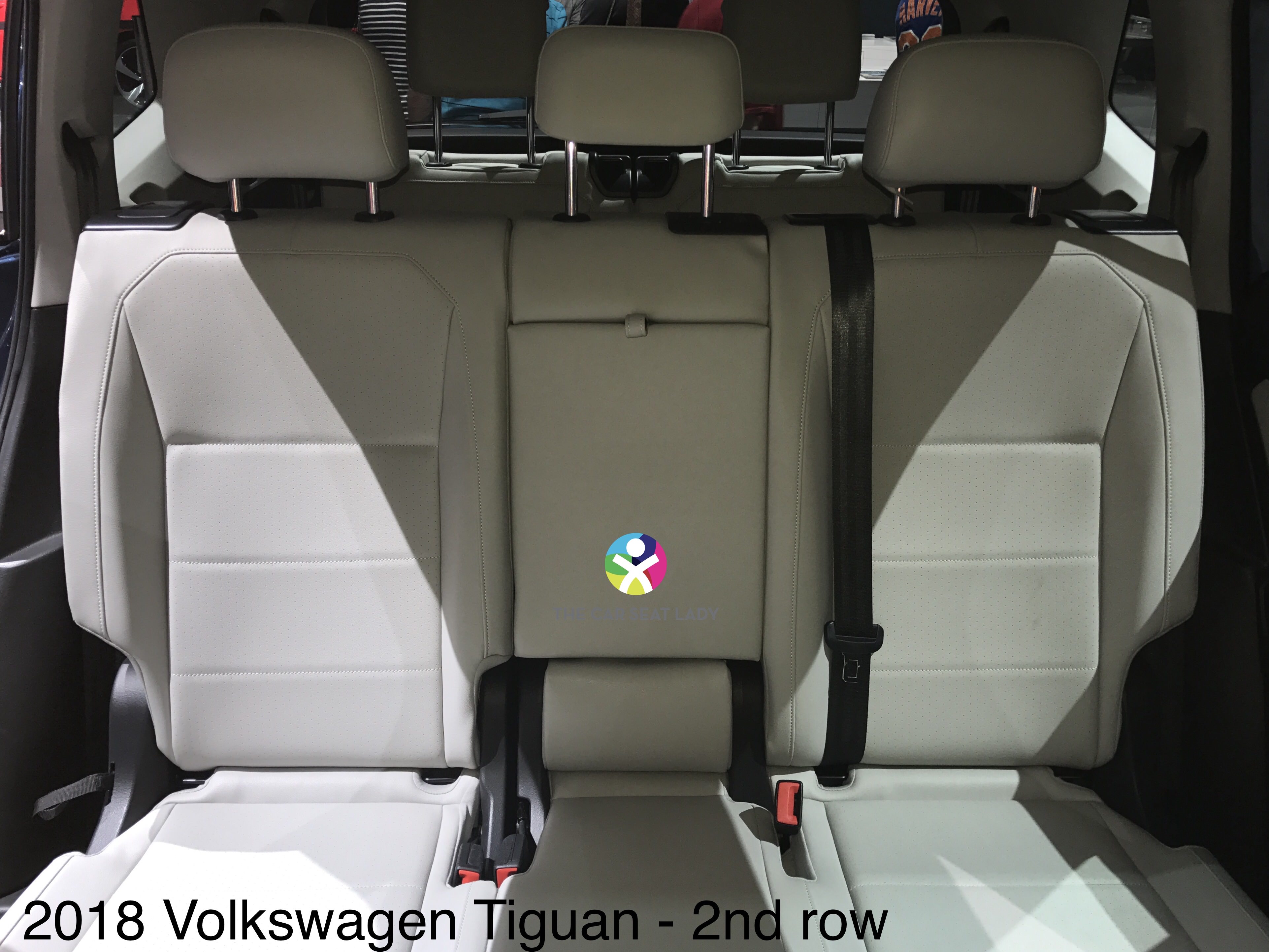
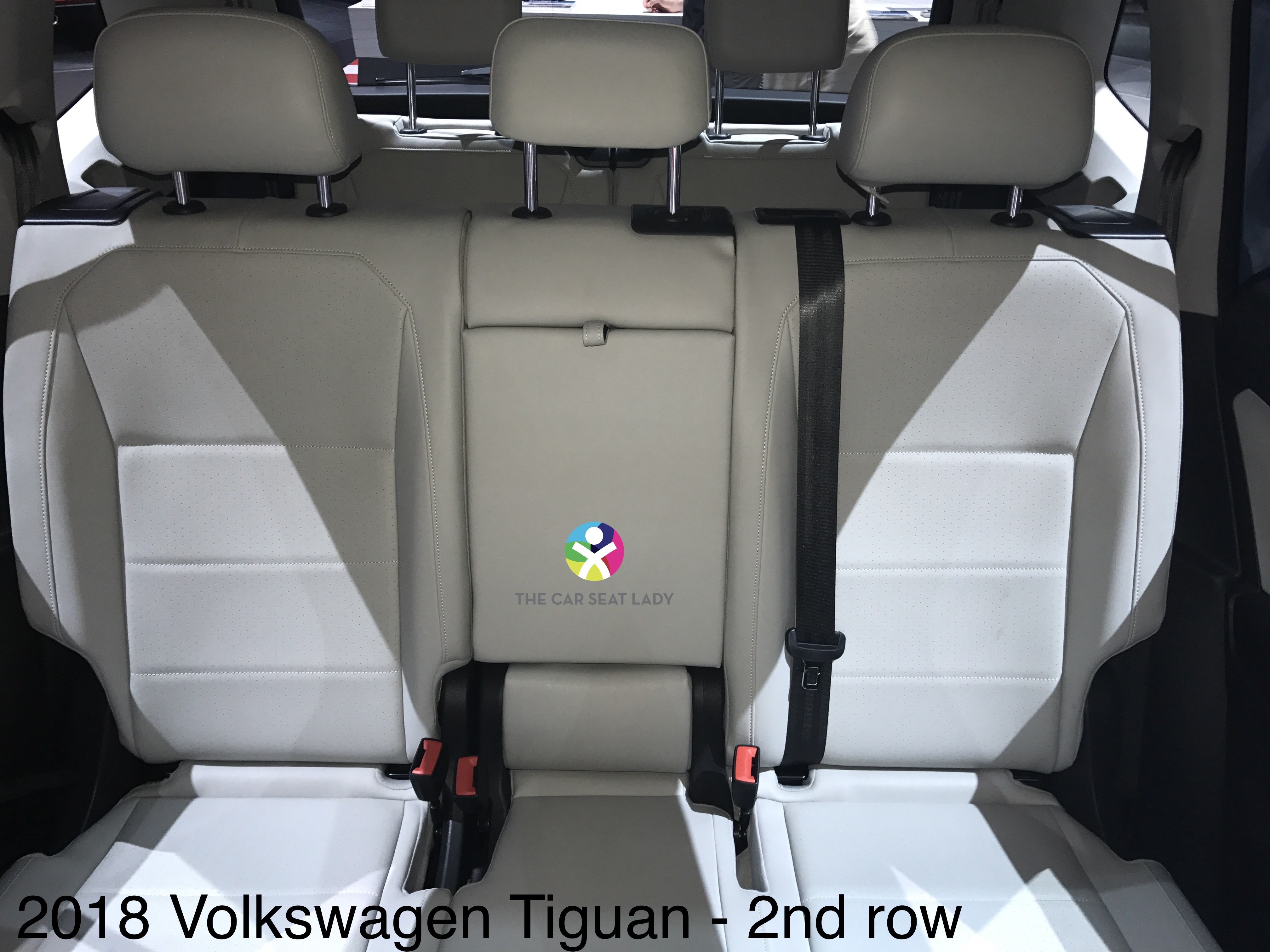
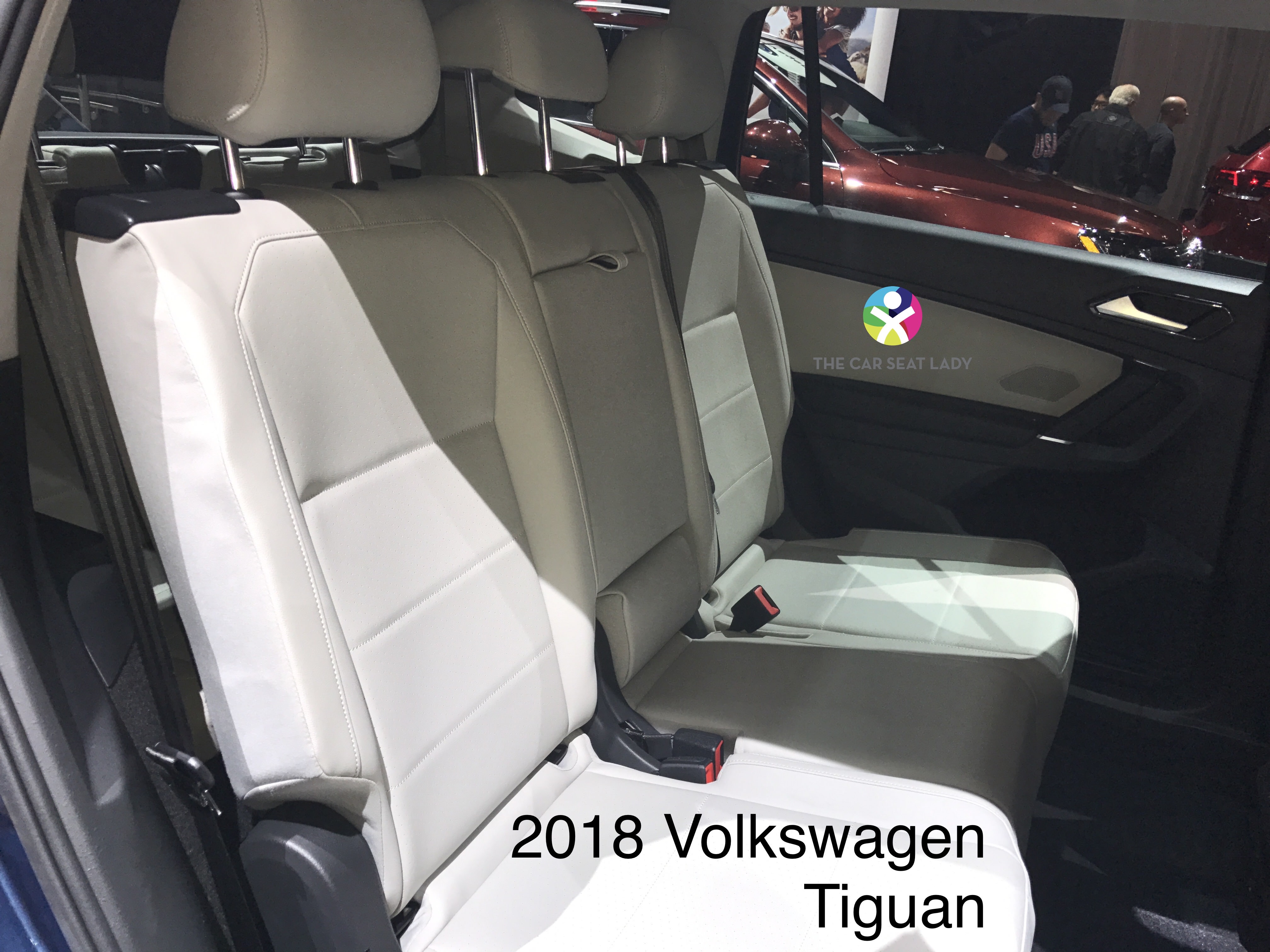
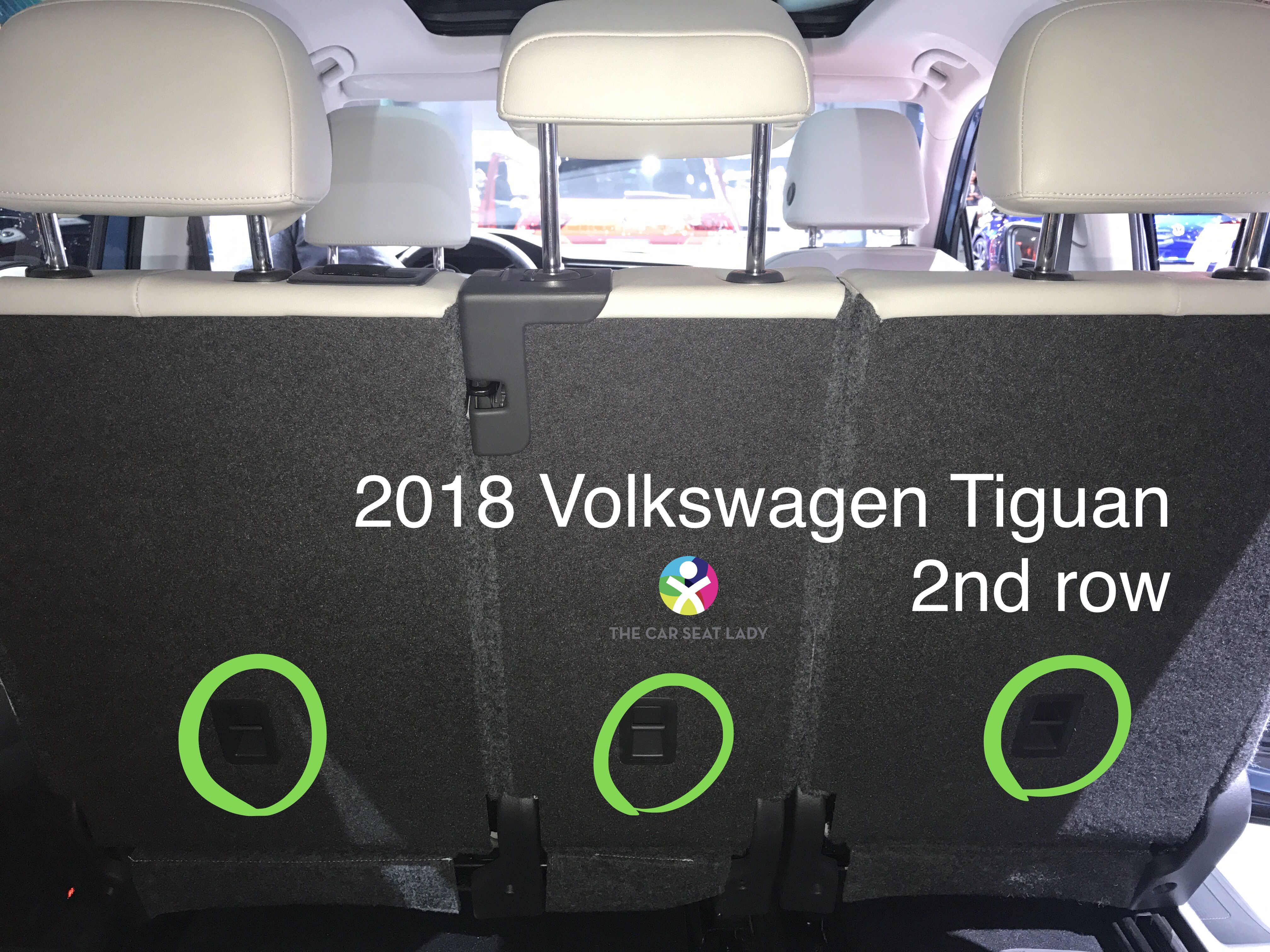
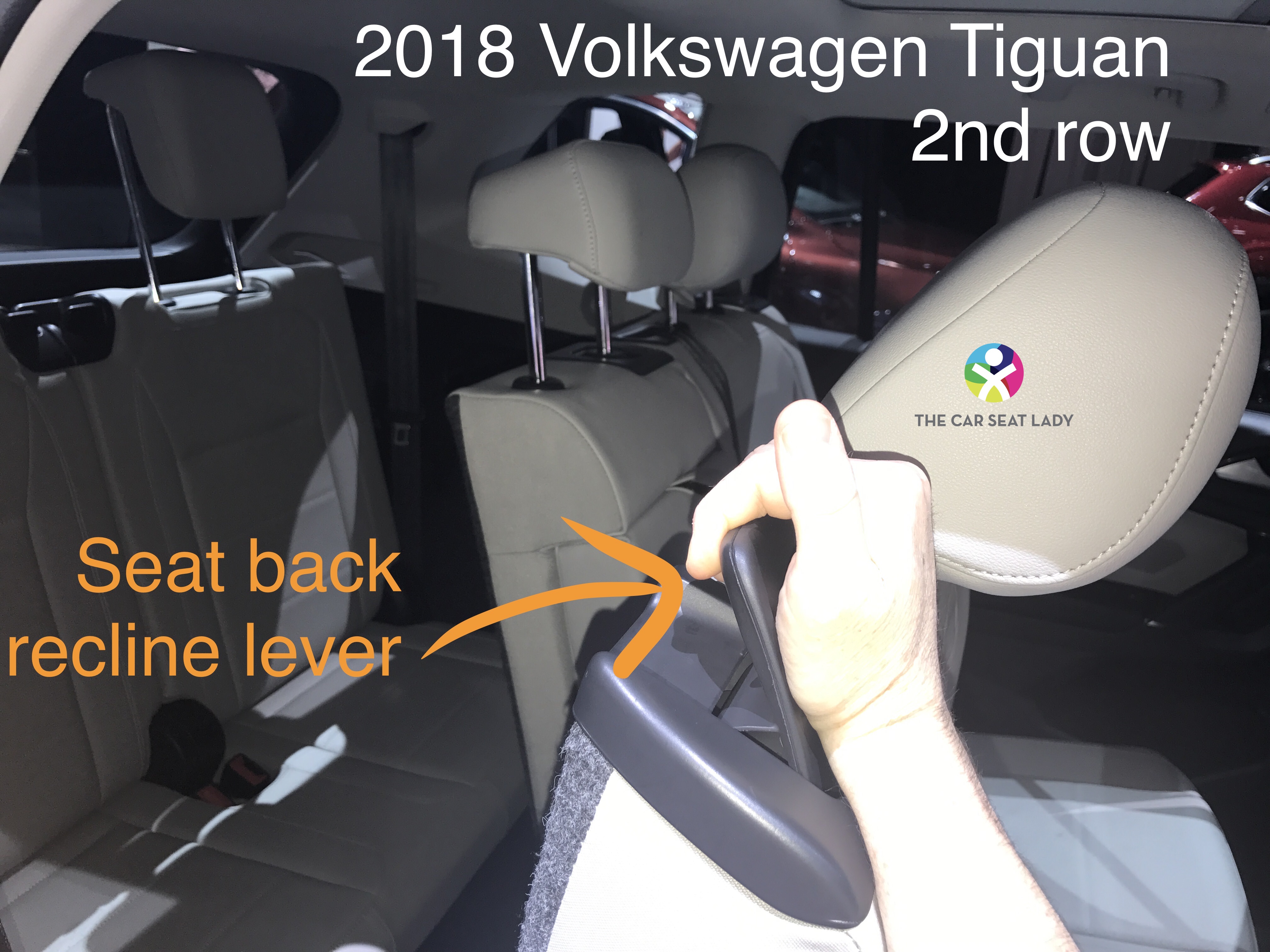
2017-2018 Volkswagen Tiguan Limited
2009-2017 Volkswagen Tiguan
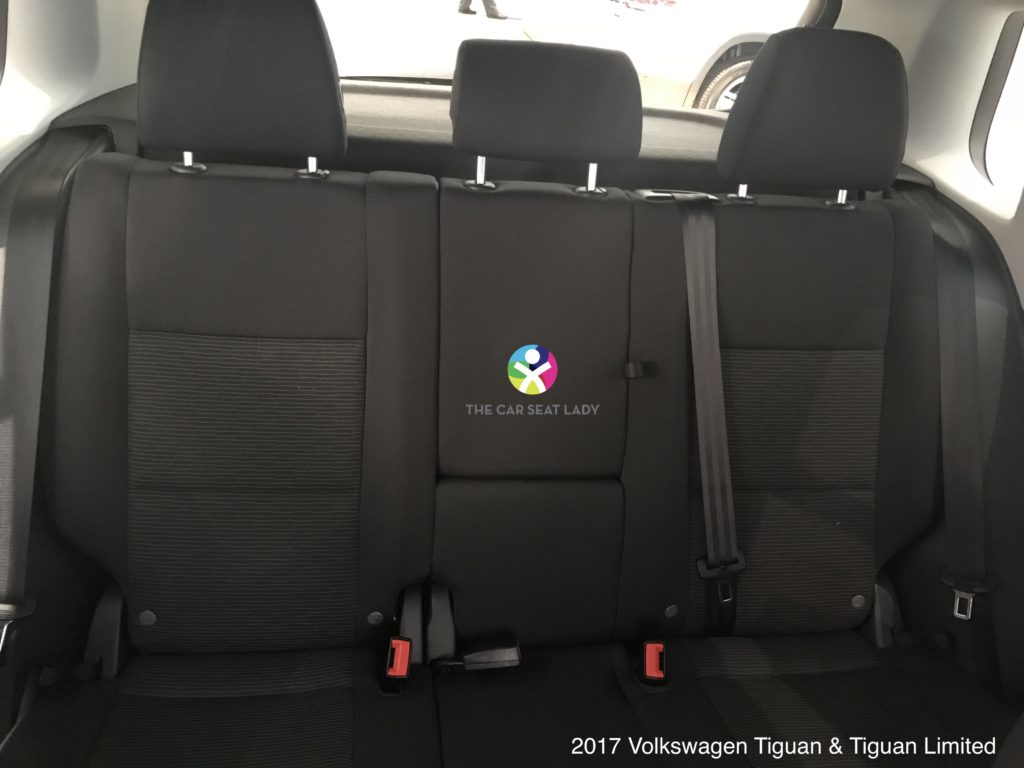
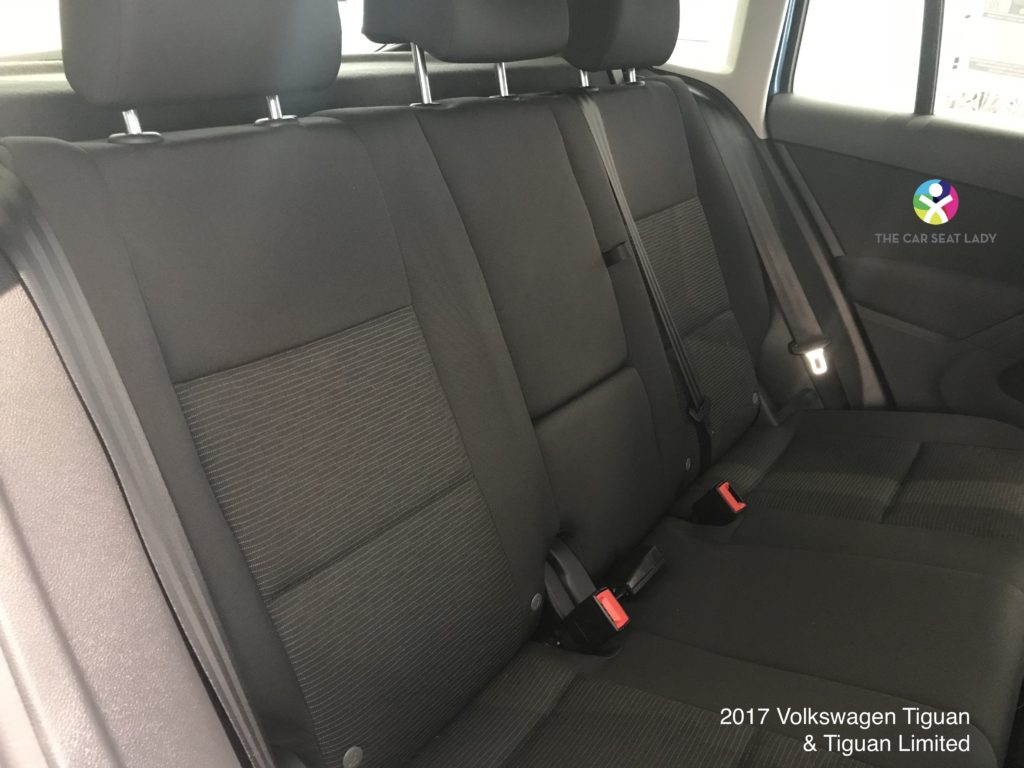
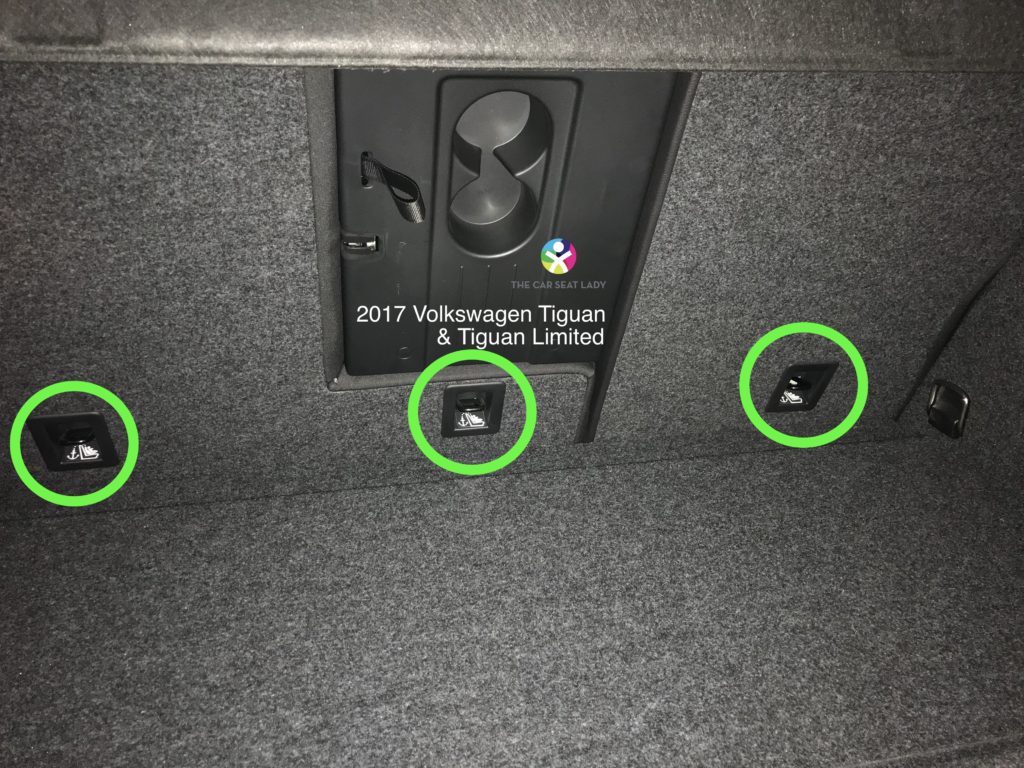
Set up a phone consultation + installation lesson with us! Book Appointment
Car Seat Installation: 2013 Volkswagen Tiguan S 2.0L 4 Cyl. Turbo
Volkswagen Tiguan Model Years — 2009, 2010, 2011, 2012, 2013, 2014, 2015, 2016, 2017
1. Getting Started — Prepare for the install
2. Seat Latches — Overview of car seat connection systems
3. Connection Points — Where the connection points are located
4. Rear Facing — Rear facing car seat connections
5. Front Facing — Front facing car seat connections
6. Boosters with Backs — Connection points for booster seats with backs
7. Booster Seats — Booster seat connections
8. More Info. — Additional thoughts on pairing devices
Learn how to install a car seat in your 2013 Volkswagen Tiguan. Regardless of whether your make has the latch system or the seat belt attachment method, this video shows how to tether a baby seat or a booster seat to the rear seats. In addition this video shows how to connect rear facing infant car seats, rear facing toddler car seats, forward facing child seats and booster with latch seats. The connection point to your 2013 Tiguan is then same regardless of what car seat is chosen. Note that most rear facing car seats do not utilize the center anchor point to connect the car seat but rely on the two lower anchor points exclusively. The center anchor point is typically only used for forward facing car seats. You should always defer to the owners manual for your specific car seat for size determinations and front vs rear facing recommendations.
Determining whether your child should be front facing or rear facing in your 2013 Volkswagen Tiguan is dependent on the height and weight of your child and the specific car seat model. The rear facing position is safest and children should remain rear facing as long as possible. It is imperative that newborns are always rear facing.
Hans Angermeier is an ASE certified Maintenance and Light Repair Technician and has produced over 100,000 videos showing drivers how to fix things on their cars. He has broad expertise on basic repair procedures covering the majority of cars on the road. Over the past 10 years, Hans has been focused on building CarCareKiosk, which is visited by millions of drivers each month.
White light when you back up — yup, they burn out and you can replace them with bright LEDs
One of the easiest fluids to top off — learn how to open the hood and where the reservoir is on your car
Replacing a dirty air filter can improve gas mileage by up to 4%. Isn’t efficiency great?
If your brake fluid is a little low, learn how to add some here. Ignoring a low level leads to big problems
We have a massive and growing video library, but we don’t have everything. yet.
Car companies often use the same engines in different cars. They also slightly alter the styling and sell the same car by two different names (amongst other tricks to help offset development costs).
Our system selects the most applicable video for your car based, in part, on these characteristics. The video displayed may not look exactly like your car, but may be relevant enough for you to get a good idea how to do it.
Use of this site constitutes acceptance of our Terms of Service and Privacy Policy. Copyright © 2010 — 2023 Flatsix, LLC. All Rights Reserved. Designated trademarks are the property of their respective owners. This Service is not affiliated with the various automotive companies featured therein.
Car Seat Installation: 2018 Volkswagen Tiguan SE 2.0L 4 Cyl. Turbo
Learn how to install a car seat in your 2018 Volkswagen Tiguan. Regardless of whether your make has the latch system or the seat belt attachment method, this video shows how to tether a baby seat or a booster seat to the rear seats. In addition this video shows how to connect rear facing infant car seats, rear facing toddler car seats, forward facing child seats and booster with latch seats. The connection point to your 2018 Tiguan is then same regardless of what car seat is chosen. Note that most rear facing car seats do not utilize the center anchor point to connect the car seat but rely on the two lower anchor points exclusively. The center anchor point is typically only used for forward facing car seats. You should always defer to the owners manual for your specific car seat for size determinations and front vs rear facing recommendations.
Determining whether your child should be front facing or rear facing in your 2018 Volkswagen Tiguan is dependent on the height and weight of your child and the specific car seat model. The rear facing position is safest and children should remain rear facing as long as possible. It is imperative that newborns are always rear facing.
Hans Angermeier is an ASE certified Maintenance and Light Repair Technician and has produced over 100,000 videos showing drivers how to fix things on their cars. He has broad expertise on basic repair procedures covering the majority of cars on the road. Over the past 10 years, Hans has been focused on building CarCareKiosk, which is visited by millions of drivers each month.
Did you know that heat is worse for your battery than cold? Replace it every 4 years
Learn how to diagnose and fix minor oil leaks in your car
If you have an electrical component that doesn’t work, try replacing the fuse first
On many cars, the high beam bulb runs at reduced power during the day — check ’em and change ’em!
We have a massive and growing video library, but we don’t have everything. yet.
Car companies often use the same engines in different cars. They also slightly alter the styling and sell the same car by two different names (amongst other tricks to help offset development costs).
Our system selects the most applicable video for your car based, in part, on these characteristics. The video displayed may not look exactly like your car, but may be relevant enough for you to get a good idea how to do it.
Use of this site constitutes acceptance of our Terms of Service and Privacy Policy. Copyright © 2010 — 2023 Flatsix, LLC. All Rights Reserved. Designated trademarks are the property of their respective owners. This Service is not affiliated with the various automotive companies featured therein.
Volkswagen Tiguan review
The Volkswagen Tiguan family SUV is the German brand’s best-selling model worldwide, and it’s a popular car here in Britain too.
It’s not hard to grasp why – the Tiguan combines family-friendly practicality with a relatively upmarket image. Crucially, it’s also cheaper than premium-badged alternatives including the BMW X1 and Volvo XC40 (especially if you get a good discount, which isn’t too difficult).
So, should you stop reading here and just go out and buy one? Well, there are a couple of things you probably ought to be aware of before making that decision.
Firstly, while the Tiguan does undercut posher-badged family SUVs at the lower end of its line-up, that isn’t necessarily the case if you want a strong engine and plenty of equipment. Secondly, it’s closely-related to the Seat Ateca and Skoda Karoq – two rival SUVs that are even more affordable.

The Tiguan’s engine options range from a 1.5-litre petrol with 128bhp (TSI 130) right up to a 316bhp 2.0 petrol that’s exclusive to the hot VW Tiguan R sports SUV (which we’ve reviewed separately). There’s also a plug-in hybrid (PHEV) model, called the eHybrid, which gives you an electric-only range of less than 30 miles and company car tax friendly CO2 emissions.
What Car? has a buying service
Once you’ve decided what you want under the bonnet, Volkswagen gives you five trims to choose from. There’s entry-level Tiguan, generously equipped Life, lifestyle-based Active, luxurious Elegance and sporty-looking R Line.
The Tiguan is designed more for the road than challenging terrain, but VW’s 4Motion four-wheel drive system is available with certain engines, and there are adjustable drive modes to help you tackle trickier conditions.
So is this latest, second generation Volkswagen Tiguan a great buy or would you be better off with one of the many alternatives in the family SUV category?
Over the next few pages of this review, we’ll tell you how it compares with its rivals for performance, interior quality, running costs and more, and also reveal our favourite engine and trim combination. And if you’re interested in the super-sized version, which is longer and has two more seats, we also have a full VW Tiguan Allspace review.
The easiest way to get a great price is by searching for the make and model you want to buy on our free What Car? New Car Deals service. You don’t have to do any haggling, and it features lots of the best new family SUV deals.
Overview
Offers generous space for its occupants and a big boot. It’s far more than just a big box on wheels, though: its fine driving manners make it a great car to own. The closely related Skoda Karoq is better value for money, though, while the Volvo XC40 has a more upmarket interior.
Performance & drive
What it’s like to drive, and how quiet it is
Engine, 0-60mph and gearbox
The Volkswagen Tiguan’s 148bhp 1.5-litre petrol engine (badged 1.5 TSI 150) is the pick for most buyers. It needs revving fairly hard to get the very best from it, but there’s enough pull from low revs. The 2.0 TDI diesel also suits the car really well and has more low-rev urgency, but we wouldn’t bother spending the extra unless you need the optional four-wheel drive (4Motion) that it’s available with.
For slightly less money, you could have a 128bhp version of the same basic 1.5 petrol engine (called the 1.5 TSI 130). However, while this engine is up to the job in the smaller Golf, it struggles more in the heavier Tiguan – and that will be particularly noticeable if you often drive with several passengers.
If efficiency is a priority, the plug-in hybrid (eHybrid) is for you. Combining a 1.4-litre petrol engine with an electric motor, it produces a total of 241bhp and is plenty fast enough to get up to motorway speeds promptly, sprinting from 0-62mph in just 7.5 seconds. When you run on the electric motor alone, it’s strong enough to keep up with traffic around town, but performance quickly tails off at higher speeds. The official electric range is 30 miles, but it’s likely to be around 25 miles in real use.
For the more performance-focused version, see our fill VW Tiguan R review.
Suspension and ride comfort
By family SUV standards, the Tiguan rides very well indeed. It smooths over bigger imperfections, such as speed bumps, better than the BMW X1 and the unsettled Jaguar E-Pace, yet its suspension is firm enough to prevent the body from bouncing up and down too much along undulating roads.
